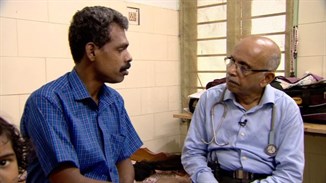Why are so many people denied the painkillers they need?
The world is suffering from an invisible epidemic, an epidemic of pain. As many as 60 million people are reckoned to suffer avoidable agony every year.
14 Jun 2018This is a situation that a visionary Indian doctor, Dr MR Rajagopal, has been campaigning to change for decades.

It isn't that the patients themselves are silent, he explains. Indeed, it was hearing the screams of agony of a neighbour in the last stages of cancer almost four decades ago that first set him on the path that would earn him his nickname: India's "father of palliative care".
"His family asked if I could help", he says, "and I couldn't, I was just a medical student."
It was his sense of helplessness in the face of that suffering that led him to specialise first as an anaesthetist, then in palliative care - the prevention and treatment of serious health-related suffering.
But after more than 30 years of activism, he acknowledges that most people's pain - not just in India but all around the world - is still ignored. That is why he describes pain as an "invisible" epidemic.
"If pain was infectious we would not have this issue," he says. "At the moment, pain is only a problem for those who suffer, for everyone else it is someone else's problem."
A key challenge is simply communicating the scale and horror of the suffering, Dr Rajagopal argues.
Share this on:
